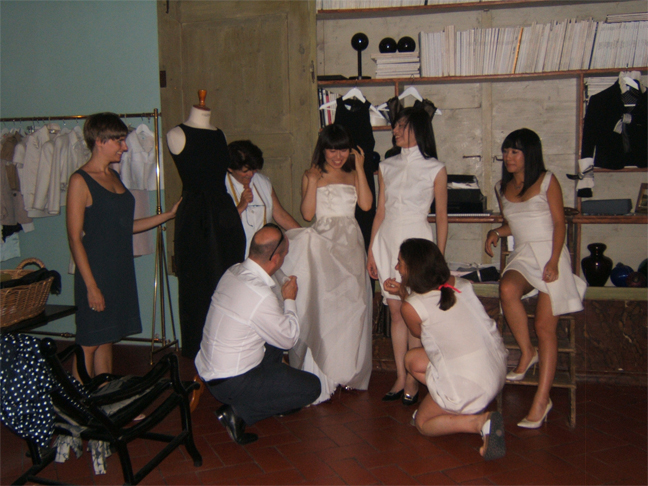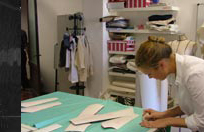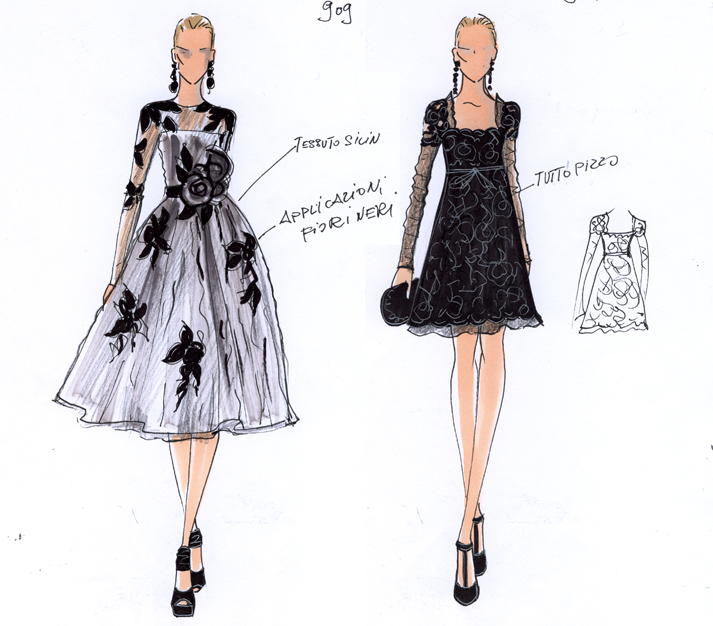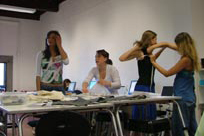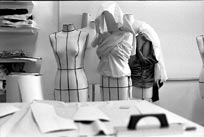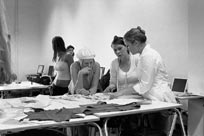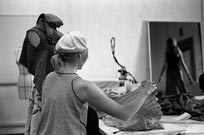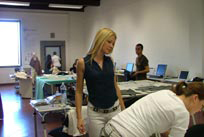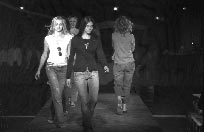FASHION DESIGN COURSES
(clic on titles to expand and get details)
FASHION ILLUSTRATION
After learning the basics of fashion drawing, students will explore the following stage adding color and shading to simulate garments and materials, getting further expertise and skills with the sketching of real models and making their work more and more fast and realistic while improving and strengthening their personal style in the process. The visit to fashion shows and fairs will offer even more expertise and set the basis for a professional career. FDFIL-130 | 45 hours | 3 credits
INTRODUCTION TO FASHION DESIGN
Being a Fashion Designer means having a full understanding of trends in style and being aware of the market changes, thus adapting creatively and effectively to keep a professional career up to date with the current changes and evolution in the fashion industry. Students will learn the basic skills to designing a full fashion product line, to improve them in the Advanced Fashion Design course (see). FDIFD-140 | 45 hours | 3 credits
ADVANCED FASHION DESIGN
All the techniques and principles found in the introductory course are expanded and perfected to give students a clear and thorough understanding of the full cycle of design and production of fashion products in a more professional way, giving them the ability to apply the principles of research, development and communication and adapting their style and creativity to products which are suitable for current market trends. This advanced course closes with the definition and creation of a professional project that testifies the students’ skills. FDAFD-141 | 45 hours | 3 credits
INTRODUCTION TO ACCESSORIES DESIGN
In a more specialized context, Fashion Design students will explore the even more creative area of accessories (hats, bags, shoes, belts, etc.) in this introductory course, learning how to use the basic tools and develop the basic skills while getting a useful knowledge of the accessories industry. As usual, students will improve their experience and abilities in this area of fashion design in the Advanced Accessories Design course. FDIAD-150 | 45 hours | 3 credits
ADVANCED ACCESSORIES DESIGN
In this advanced level course, students will apply their knowledge and skills to the design and production of a complete line of fashion accessories, leveraging their work to professional industry standard and focusing on the aesthetic and stylistic value of each accessory. In the final part of this course, they will work on a full design project. FDAAD-151 | 45 hours | 3 credits
INTRODUCTION TO PATTERN MAKING DRAPING AND SEWING
In this fundamental course, students will learn the basics of patternmaking and draping which will lead them to the creation of a prototype. Patternmaking is the most technical way to create a garment, both using existing patterns and creating new ones through custom measurements. The other method to create a garment is draping, and together with sewing will complete the students’ introductory path from the conceptual phase of creative projects to the creation of finished garments, which will be perfected in the advanced course. FDIPMDS-160 | 45 hours | 3 credits
ADVANCED PATTERN MAKING DRAPING AND SEWING
In the advanced course students will improve their skills in patternmaking, draping and sewing applying them to more complex fashion garments and working on real and complete projects whit all the elements and variation found in outerwear, active wear or evening wear. Their focus will be mainly on the cuts and fits of garments, with a special attention to proper fit and the use of specialty fabrics, to develop a true professional style and working method. FDAPMDS-161 | 45 hours | 3 credits
TEXTILE AND FABRIC
The importance of textile and fabric in the learning path of a fashion professional is vital, as they represent the basis for both creative and functional choices in the creation of any product. After a short but exhaustive tour in the history and traditions of textile and fabric and their evolution students will learn the fundamentals of the science behind these materials, the relevant terminology and the processes used in the industry of textile and fabric: from the functioning of yarns, weaves and cloth construction to printing, dyeing and finishing (the latter are taught also in a more specialized course, see Printing Techniques). FDTAF-170 | 45 hours | 3 credits
YARN AND KNITWEAR
Knitwear has a long established tradition and is still considered an important element in the fashion industry. In this course students will learn about yarn types suitable for knitwear, including some basics of construction and materials, knit structure and knitted garments. After a short introduction to the history of yarn and knitwear, students will analyze and understand the technologies behind modern knitwear design and knitting equipment, and finally explore the application of yarn and knitwear in fashion collections through examples of fashion designers. FDYAK-180 | 45 hours | 3 credits
PRINTING TECHNIQUES
Any fashion professional must have a solid knowledge of the dyeing and printing processes, and this specialized course aims to give students the basics of color and its use on natural and synthetic materials. Students will be introduced to the main printing techniques for cloth and other materials like yarn, leather and fake leather, and will be able to choose the best color and printing solutions in their professional career as fashion designer, both in developing their own creative idea and in choosing suitable elements from existing printing collections. FDPRT-190 | 45 hours | 3 credits
FINISHING METHODS AND PROCESSES
Once a fabric is designed, what makes the real difference in quality and adds preciousness is the chosen finishing method and process, together with the use of high technology tools and materials in order to create a perfect fabric. What makes the difference in the quality of fabric and its processing is the fabric ‘touch’, and in this course students will learn how the best suited products in fabric processing add the unique preciousness typically found in fashion garments. FDFMP-190 | 45 hours | 3 credits
LEATHER TECHNOLOGY
The processing and manufacturing cycle of leather and derivate products (garment, shoes, bags, belts, wallets, etc.) is the sum of best technology, quality materials and experience. This makes the difference in fashion products we find both in leather materials collections and in garment and accessories collections. Students will learn about the main processes and manufacturing technologies and methods, while analyzing the different products and materials used in the industry. FDLET-200 | 45 hours | 3 credits
TEXTILE AND APPAREL FAIRS/EXHIBITIONS
Fairs and exhibitions are essentials moments in the life cycle of fashion, as every element of this cycle is found inside these events: yarns, fabrics, garment and accessories come under the scrutiny of fashion professionals, designers and entrepreneurs, to be chosen as elements of forthcoming collections and products. In this course students will learn the mechanics and strategies behind fairs planning and management, and at the end of the course they will be able to make the most from fashion fairs and exhibitions both as a visitor and as a consultant in their planning and management. FDTAFE-210 | 45 hours | 3 credits
2D GRAPHICS FOR FASHION
The use of software in Fashion includes both horizontal and vertical applications, where the former are inherited from the more general graphic design area and adapted to the creative and technical processes of fashion design. In this course students will learn how to translate their creative ideas into digital representation and simulation of materials and products, and how to create style sheets and spec sheets for industry use. An overview of the main vertical software solution used in the fashion industry will complete this introductory course and enrich the professional background of each student. FDBDGF-220 | 45 hours | 3 credits
3D GRAPHICS FOR FASHION
3D CAD (Computer Aided Design), both in mainstream horizontal software and in specialized vertical applications, is a fundamental element in fashion design and production. In this course students will learn how to design and simulate shapes, colors and surfaces to transform their fashion ideas in realistic models. The course aims to give future fashion professionals a broad understanding of CAD software with a particular focus on apparel design and development. FDTDGF-230 | 45 hours | 3 credits
FASHION COLLECTION PROJECT CREATION
This course is designed to give students the basic know-how and skills to manage the complete process that leads to the creation of an entire fashion collection, with the aid of a well-defined project outline based on a personal idea. The typical Italian fashion design system will be covered and fully explained, and students will be assisted in every step by Italian industry professionals guiding them through the complete process from the original starting idea to the final production of a complete collection. At the end of this course students will be able to manage their own professional fashion collections from start to finish. FDFCPC-240 | 45 hours | 3 credits
ACCESSORY COLLECTION PROJECT CREATION
This course is designed to give students the basic know-how and skills to manage the complete process that leads to the creation of an entire accessory collection, with the aid of a well-defined project outline based on a personal idea. The typical Italian fashion design system will be covered and fully explained, and students will be assisted in every step by Italian industry professionals guiding them through the complete process from the original starting idea to the final production of a complete accessory collection. At the end of this course students will be able to manage their own professional accessory collections from start to finish. FDACPC-250 | 45 hours | 3 credits
SUSTAINABLE FASHION
The responsibility of today’s fashion designers towards environmental issues has led to the definition of “sustainable fashion” concept, in which materials, processes and styles are designed and chosen according to the demands of social, economic and environmental sustainability. Among the objective of this course is the search for solutions in fashion materials, colors, design and production that take into account both the sources and destination of materials towards a more conscious relation with the environment. FDSUF-260 | 45 hours | 3 credits
HISTORY OF EUROPEAN COSTUME
This fundamental course allows students to build a comprehensive understanding of the origin and evolution of European clothing, in relation to social history, economics, technology and politics. Students will familiarize with the terminology, the concepts and the fashion theories related to the history of clothing in Europe, acknowledging its essential role in society and becoming able to recognize and anticipate fashion trends and their implications. FDHEC-270 | 45 hours | 3 credits
HISTORY OF ASIAN COSTUME
This fundamental course allows students to build a comprehensive understanding of the origin and evolution of Asian clothing, in relation to social history, economics, technology and politics. Students will familiarize with the terminology, the concepts and the fashion theories related to the history of clothing in Asia, acknowledging its essential role in society and becoming able to recognize and anticipate fashion trends and their implications. FDHAC-280 | 45 hours | 3 credits

